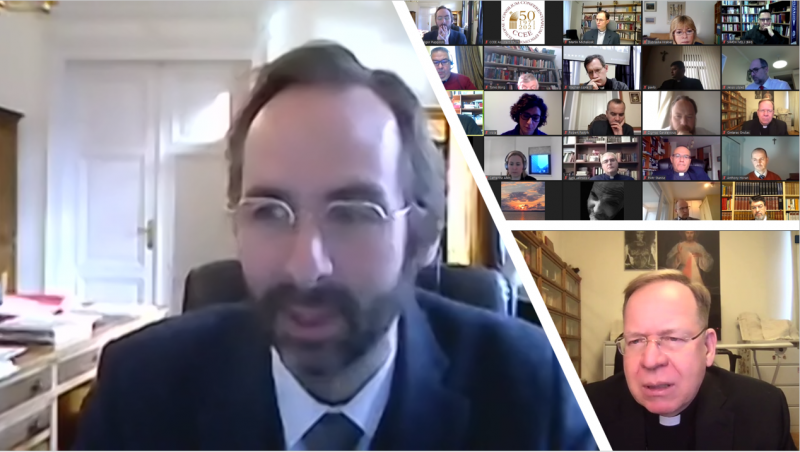On the morning of 7 December 2021, twenty-six legal advisers from the European Bishops’ Conferences took part in a virtual meeting to consider the specifics of the restrictions put in place by European governments in the face of the challenge to contain the spread of the SARS-CoV-2 virus (Covid-19).
The meeting began with greetings from the CCEE President, H.E. Msgr Gintaras Grušas, Archbishop of Vilnius (Lithuania), and from Fr Martin Michalíček, CCEE General Secretary.
Fr. Luis Okulik, coordinator of the CCEE’s group of legal advisors, introduced the work with a reflection on the freedom of the Church and the principle of cooperation in relations between the Church and the political community.
Afterwards, Prof. Grégor Puppinck, Director of the European Centre for Law and Justice, presented a report on the constitutional and legal profiles of restrictions on religious freedom in the context of the health emergency.
Noting the diversity of measures implemented in the various European countries, Prof. Puppinck analysed their elements of legality and highlighted some situations of difficulty in adequately balancing respect for religious freedom and the need to protect public health, as has been reflected in the judgments of several European courts called upon to resolve disputes that have arisen in the last year and a half.
Particular attention was paid to European laws protecting individual freedoms, and religious freedom in particular, as well as to international law, especially the International Treaty on Civil and Political Rights (1966), which requires that any restriction imposed in an emergency must comply with the obligations of international law and not incur arbitrary discrimination, respecting criteria of proportionality and temporality.
Prof. Puppinck then made a heartfelt appeal to legal advisors to study religious freedom in greater depth and the consequences that any compression of this right can have on the lives of believers. The Catholic Church,” he said, “must continue to be the place par excellence where freedom and reason are promoted and safeguarded.
In the second part of the meeting, the legal advisors presented their reports on the situation in their respective countries, describing the measures applied and the different forms of intervention by the respective Bishops’ Conferences.
Before concluding, Dr. Alessandro Calcagno, Vice-Secretary of COMECE, outlined some of the challenges faced in this period regarding particular European legislation and rulings of the European Court of Justice on issues affecting religious freedom and its different forms of expression.
The Advisors’ meeting ended with a prayer and an early exchange of Christmas greetings.
Attached is the complete text of Prof. Puppinck.

